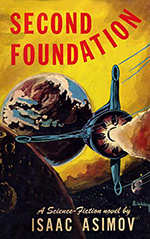
![]() verkisto
verkisto
7/26/2016
![]()
I'm starting to realize that the lasting appeal of this series is less with the stories themselves and more with the ideas they represent. Psychohistory and all of its ramifications is fascinating, but the characters and conflicts that are going on in the stories themselves are less so. Part of it, I think, is the way that we experience the entire story up to its end, and then experience a quick, short reveal that tells us what actually happened during the course of the story. It's kind of like reading a mystery, only without the clues to give you a fair chance to figure it out yourself, since most of the details are behind the scenes until that revelation.
The stories also feel terribly dated. Save for one character, the women are portrayed as unimportant, and what characteristics they have are usually insignificant to the rest of the story. The book is a product of its time, so that's somewhat forgivable, but in a future set some thousands of years after our current time, I would like to think that folks had grown progressive enough to view women more equally. Then again, this is a future society where they still use a lot of paper for communications, so maybe they're not as progressive as I imagined. I'm surprised that someone like Asimov didn't think fat enough ahead about those kinds of things.
Aside from the anachronisms, the prose itself feels archaic. It's not that it's peppered with outdated language (though seeing an "Oh, golly" as an expletive made me laugh out loud), but that the structure of the narrative itself felt like it was out of place, or, better yet, out of time. This is the last of the books in the entire series to have been published in the 1950s (the next four books were published in the '80s), so maybe the rest of the series will feel a bit more modern.
One of the unfortunate side-effects of having novels made of linked short stories is that you get a lot of information over and over again. I get it: You write a story that follows from a previous one, and you need to do a summary of what happened in that previous one in case you're picking up new readers. I can even see Asimov wanting to do this sort of thing with each novel, but when you have nine stories that make up three novels, then you wind up with nine introductions to who Hari Seldon was, how he developed psychohistory, and what's transpired since then. It's a bit annoying, and it reminds me of re-encountering the whole "everyone's infected and will return as a zombie no matter how they die" thing in the Walking Dead franchise. In each case (the comic, the show, the novels, and the video game), it's this huge, surprising revelation, but once you've been through it once, it loses its effect. In those cases, though, you can't really do without it; when combining all these stories, I feel like you can, at least to some degree.
Still, the ideas are interesting, and Asmiov tells the story like a mystery, and I wound up enjoying it more than I expected. The second half of the book is a big improvement over the first, but once you get past the big, important ideas of Foundation, the other stories lose their luster.